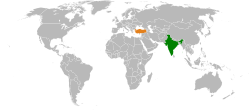India–Turkey relations
India–Turkey relations refer to foreign relations between India and Turkey. Since the establishment of diplomatic relations between India and Turkey in 1948, political and bilateral relations have been usually characterised by warmth and cordiality, although some sporadic tensions remain due to Turkey's support for Pakistan, India's rival.[1][2] India has an embassy in Ankara and a consulate–general in Istanbul. Turkey has an embassy in New Delhi and a consulate-general in Mumbai. As of 2015, the bilateral trade between India and Turkey stood at US$6.26 billion.[3]
 | |
India |
Turkey |
|---|---|
| Diplomatic mission | |
| Embassy of India, Ankara, Turkey | Embassy of Turkey, New Delhi, India |
| Envoy | |
| Ambassador of India to Turkey Sanjay Panda | Ambassador of Turkey to India Sakir Ozkan Torunlar |
History
Economic and cultural relations between ancient India and Anatolia date back to the Vedic age (before 1000 BCE).[4] During World War I, the British Indian Empire played a pivotal role in the successful Allied campaign against the Ottoman Empire.[5] There are deep historical connections between India and Turkey. The first exchange of diplomatic missions between the Ottoman Sultans and the Muslim rulers of the sub-continent dates back to the years 1481–82. A strong historical connection between Indian Muslims and Turkey exists dating back to the medieval era and fostered with the late 19th and 20th century interaction between the two.[1] India and Turkey also have a cultural overlap. The Turkic impact on India in areas such as language, culture and civilisation, art and architecture, and costumes and cuisine was considerable. There are also over 9,000 words common in Hindi and Turkish languages. More recent historical contacts between India and Turkey were reflected in the medical mission led by renowned Indian freedom fighter, Dr M A Ansari, to Turkey in 1912 during the Balkan Wars. India also extended support in the 1920s to Turkey's War of Independence and the formation of the Turkish republic. Mahatma Gandhi himself took a stand against the injustices inflicted on Turkey at the end of World War I.[6]
Turkey recognised India right after its declaration of independence on 15 August 1947 and diplomatic relations were established between the two countries. As Turkey was part of the Western Alliance and India of the Non-Aligned Movement during the Cold War era, the bilateral relations did not develop at a desired pace. However, since the end of the Cold War era, both sides put in effort in developing their bilateral relations in every field.[7] In contemporary times, relations between India and Turkey have been strained due to Turkey's religious mutuality with Pakistan. Until recently, Turkey was a vocal advocate of Pakistan's position on the Kashmir dispute.[8] Turkey was also one of the few opponents to India's inclusion into the Nuclear Suppliers Group.[9] However, in recent years, the relations between the two countries have warmed due to common strategic goals, and there is a growing bilateral cooperation in the fields of education, technology and commerce.[10] Turkey has softened its pro-Pakistani approach on the Kashmir issue thinking that it is important to build up a coherent and comprehensive relationship with India and develop a holistic Asian policy. Turkey has since reversed its support to Pakistan's position on Kashmir, moving from a call for a plebiscite under UN supervision to stressing the importance of India-Pakistan bilateral talks to resolve the issue, which is by and large closer to India's position,[1] India's GMR Group is one of the main stakeholders in the new Sabiha Gökçen International Airport in İstanbul.[11] Both the countries are members of the G20 group of major economies, where the two countries have closely cooperated on the management of the world economy. Bilateral trade in July 2012 stood at US$7.5 billion, a figure that is expected to double to US$15 billion by 2015. Strategically too, there are growing areas of consensus. On Afghanistan, Turkey had taken the lead in 2011 to begin the Istanbul Process to find meaningful and sustainable solutions to Afghanistan's problems. The Istanbul Process culminated in the annual “Heart of Asia” regional conference on Afghanistan held in Kazakhstan’s former capital, Almaty, with both India and Turkey playing important roles. In the context of the planned 2014 withdrawal of NATO and US troops from Afghanistan, the need for Delhi and Ankara to intensify dialogue over Afghanistan has acquired a particular importance.[12]
India condemned Turkey for its military offensive into north-eastern Syria, claiming it would undermine regional stability and the fight against terrorism. India also called upon Turkey to exercise restraint and respect the sovereignty and territorial integrity of Syria.[13]
Bilateral trade relations
The bilateral trade relations started its new phase and both sides emphasised the importance of developing bilateral cooperation programmes with the aim to enhance their commercial relations on a mutually beneficial and sustainable basis. However, as the world's second-most populous country, India’s progress in gaining importance in the global economy and international politics since the 1990s has led to Turkey's quest to develop a new strategy for South Asia. Turkey has also begun to prioritise India in South Asian politics while preserving its traditionally good relations with Pakistan and Bangladesh. In recent years, the relations between the two countries have warmed due to common strategic goals, and there is a growing bilateral cooperation in the fields of education, technology and commerce.[14]
On 18 March 2012, Burak Akçapar, Ambassador of the Republic of Turkey in India, announced that Turkey sought to double flights from India and open four more connecting points. Other destinations considered are Hyderabad, Chennai, Kolkata and Bengaluru. At present, Turkish Airlines operates daily flights from Mumbai and New Delhi to Istanbul. A joint study on a free trade area was conducted, but is yet to be signed. He also announced that consulates in Chennai and Hyderabad, in South India, are planned to be started, as permission had been gained from the Indian government.[15]
Investments
More than 150 companies with Indian capital have registered businesses in Turkey in the form of joint-ventures, trade and representative offices. These include M/s Polyplex, GMR Infrastructure, TATA Motors, Mahindra & Mahindra, Reliance, Ispat, Aditya Birla Group, Tractors and Farm Equipment Ltd, Jain Irrigation, Wipro and Dabur. Turkey ranks 41st overall in terms of FDI inflows to India. Cumulative Turkish direct investment into India amounts to US$87.18 million (April 2000 – Apri2014). In September 2019, Turkey had criticized India on the issue of Jammu and Kashmir and the revocation of article 370. It made vocal comments against India at the United Nations. Thereby it favoured the position of Pakistan in this respect. Due to this the relationship between India and Turkey has caused a temporary strain.
Cooperation in Space Technology
Turkey's first nano satellite "ITUpSAT1", manufactured at the Istanbul Technical University's Faculty of Aeronautics was sent to space on a PSLV C-14 rocket by the Indian Space Research Organisation (ISRO) on 23 September 2009. The satellite orbited the earth at an altitude of 720 kilometres and had the capacity to take continental photos. Its orbital life was six months. Turkey is keen to expand cooperation in space technology with India.[2]
Defence cooperation


During the visit of Prime Minister Turgut Ozal to India in 1986, it was agreed that the two embassies will house Defence Attaché office. During the visit of Prime Minister Vajpayee in September 2003, it was decided that Defence Ministers of both countries should remain in closer touch. India conveyed its willingness to expand military to military contacts, and mutual exchange of delegations to training facilities. During the visit of the Turkish Prime Minister Erdoğan to India in November 2008, both prime ministers agreed to enhance cooperation between the two defence forces.[2] As far as the military exercises between India and Turkey is concerned, there has been a regular but a low profile passage exercises (PASSEX) between the Navies of the two countries.[16]
References
- "Can the Rise of 'New' Turkey Lead to a 'New' Era in India-Turkey Relations?" (PDF). Idsa.in. Retrieved 18 October 2017.
- "India-Turkey Relations : Executive Summary" (PDF). Mea.gov.in. Retrieved 18 October 2017.
- "From Rep. of Turkey Ministry of Foreign Affairs". Republic of Turkey Ministry of Foreign Affairs. Retrieved 18 October 2017.
- Shyam Chaurasia, Radhey (May 2002). History of Ancient India: Earliest Times to 1000 A. D. Atlantic Publishers & Dist, 2002. ISBN 9788126900275.
- J. Schmidt, Karl (1995). An Atlas and Survey of South Asian History. M.E. Sharpe.
- "India-Turkey Relations" (PDF). Mea.gov.in. Retrieved 18 October 2017.
- "From Rep. of Turkey Ministry of Foreign Affairs". Republic of Turkey Ministry of Foreign Affairs. Retrieved 18 October 2017.
- "Turkey-India Relations in the Framework of Ankara's New South Asian Strategy". Turkishweekly.net. Archived from the original on 11 May 2015. Retrieved 18 October 2017.
- "India and Turkey: Friends Again?", The Diplomat, July 19, 2013
- "Turkey and India cement cooperation with new agreements". Trend. 8 October 2013. Retrieved 19 July 2015.
- Amit Mitra. "GMR to remain invested in Istanbul airport". The Hindu Business Line. Retrieved 19 July 2015.
- "India and Turkey: Friends Again?". Thediplomat.com. Retrieved 18 October 2017.
- "India slams Turkey for its 'unilateral military offensive' in northeast Syria | India News – Times of India". The Times of India. 10 October 2019.
- Andrabi, Doctor Abroo Aman. "Indo-Turkish Relations: A Historical Overview and Analysis". Academia.edu. Retrieved 18 October 2017.
- K.V. Kurmanath. "Turkey to double flights from India". The Hindu Business Line. Retrieved 19 July 2015.
- Mohammad Samir Hussain (2011). "Forging a New Partnership: India and Turkey" (PDF). Journal of Alternative Perspectives in the Social Sciences. 3: 635–655.

